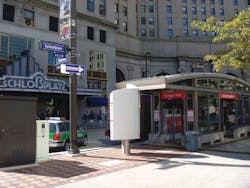As a moderate-sized Midwest city in the summer, living is easy. There may be more people out and about during the warm months downtown than in the winter, but that's about it. Not so when Hollywood comes to town.
Overturned cars, major explosions with black smoke, and actor sightings are all the norm, while thousands of people flood in to try and feel the Hollywood excitement.
At the same time, behind the scenes, a transit agency is required to make major changes to accommodate filming, while still operating its regular 24-hours-a-day, seven-days-a-week service.
In the case of the Greater Cleveland Regional Transit Authority (GCRTA), dozens of services had to be rerouted during the day, at night and at the last minute for various films taking advantage of Ohio's film tax credits. The challenges include operator re-route instructions, internal communication and getting the word out effectively to customers.
Here are a few lessons learned from GCRTA this summer while accommodating the filming of a half dozen motion pictures this summer, largest by far being The Avengers.
Plan Ahead: Do as much advance planning as possible. This includes selecting team members and affected parties internally. Operations worked with film-makers and the city of Cleveland at every step. Operations worked with communication staff to see who 'needs to know' and will disseminate the info externally.
Teams: Select individuals in your organization who are key players in all departments. Establish an emergency call list for those team members who are available 24/7 in the event of a change or an emergency. Individuals on these committees should always include those in communications positions (media relations, marketing, customer call center, those in operations and at the districts where buses or trains are affected, and transit police and/or the local police.
Schedule regular briefings, especially if there is a big change or sudden change; so the time is already held. Assign someone to document changes, concerns and updates each meeting.
Use all your communications tools: Use all communication methods/channels possible: GCRTA used Facebook, Twitter, Commuter Alerts, media alerts, website, phone calls to media and customer service representatives to tell customers about the changes. RTA created a special 'Avengers' Commuter Alert, where 700 customers signed up for and received closure 'alerts' via text and/or email and changes if they happened. The sign shop and graphic designers were also kept busy with a plethora of signs to tell customers where to catch a bus if filming blocked off streets and intersections. Additional transit police officers assisted the city of Cleveland when drivers and pedestrians needed to be re-routed to an unusual spot.
Be consistent: If you tell customers to expect a route to change, and film crews make changes, stick with what you've told customers for that day. If filming ends at 2 p.m., but the reroute goes through rush hour, stick with it. If you get a street back a day earlier than expected, though, go with it. Just remember to tell everyone about the changes ASAP, inside and outside the organization.
Expect the Unexpected: Outside filming depends on weather conditions, so the end-date that you were initially given may not be the final filming date. There also may be (and consistently were with several movies) additional last-minute changes and lengthier filming days than initially scheduled. Be flexible and nimble, while consistently communicating with customers.
The next movie in production in Cleveland -- I, Alex Cross -- involves closures of two major streets in September, affecting dozens of bus routes.
In the end, customers know that a transit agency is helping boost a city's bottom line, even though they might be inconvenienced along the way.
GCRTA carried thousands of people to and from work every day and kept up normal business for all customers, just like every other day. Even with Hollywood and tourists taking over, the mission of safe transport was accomplished.
Mary McCahon and Chris Lewis are in media relations at the GCRTA.



